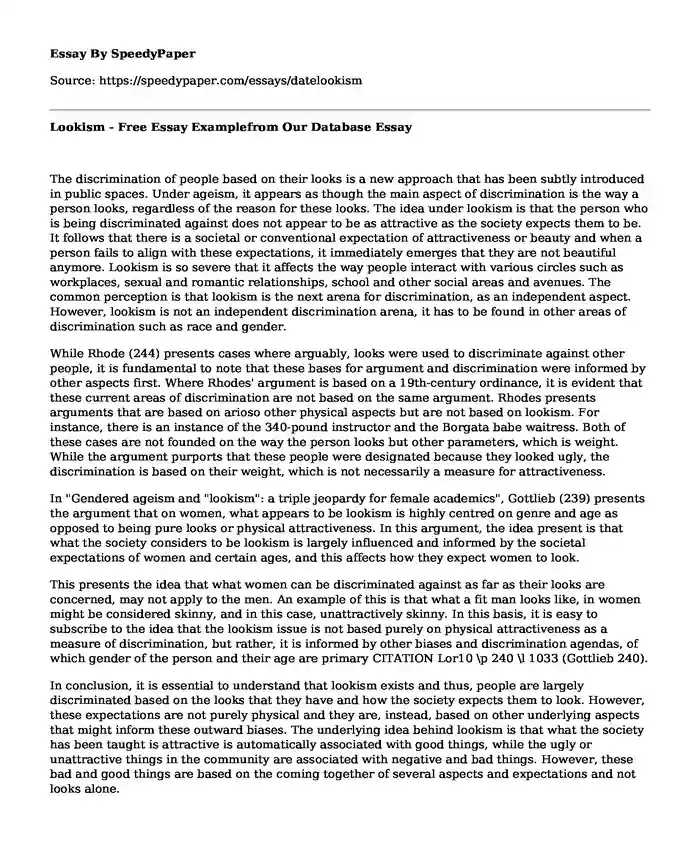
| Type of paper: | Essay |
| Categories: | Discrimination |
| Pages: | 3 |
| Wordcount: | 635 words |
The discrimination of people based on their looks is a new approach that has been subtly introduced in public spaces. Under ageism, it appears as though the main aspect of discrimination is the way a person looks, regardless of the reason for these looks. The idea under lookism is that the person who is being discriminated against does not appear to be as attractive as the society expects them to be. It follows that there is a societal or conventional expectation of attractiveness or beauty and when a person fails to align with these expectations, it immediately emerges that they are not beautiful anymore. Lookism is so severe that it affects the way people interact with various circles such as workplaces, sexual and romantic relationships, school and other social areas and avenues. The common perception is that lookism is the next arena for discrimination, as an independent aspect. However, lookism is not an independent discrimination arena, it has to be found in other areas of discrimination such as race and gender.
While Rhode (244) presents cases where arguably, looks were used to discriminate against other people, it is fundamental to note that these bases for argument and discrimination were informed by other aspects first. Where Rhodes' argument is based on a 19th-century ordinance, it is evident that these current areas of discrimination are not based on the same argument. Rhodes presents arguments that are based on arioso other physical aspects but are not based on lookism. For instance, there is an instance of the 340-pound instructor and the Borgata babe waitress. Both of these cases are not founded on the way the person looks but other parameters, which is weight. While the argument purports that these people were designated because they looked ugly, the discrimination is based on their weight, which is not necessarily a measure for attractiveness.
In "Gendered ageism and "lookism": a triple jeopardy for female academics", Gottlieb (239) presents the argument that on women, what appears to be lookism is highly centred on genre and age as opposed to being pure looks or physical attractiveness. In this argument, the idea present is that what the society considers to be lookism is largely influenced and informed by the societal expectations of women and certain ages, and this affects how they expect women to look.
This presents the idea that what women can be discriminated against as far as their looks are concerned, may not apply to the men. An example of this is that what a fit man looks like, in women might be considered skinny, and in this case, unattractively skinny. In this basis, it is easy to subscribe to the idea that the lookism issue is not based purely on physical attractiveness as a measure of discrimination, but rather, it is informed by other biases and discrimination agendas, of which gender of the person and their age are primary CITATION Lor10 \p 240 \l 1033 (Gottlieb 240).
In conclusion, it is essential to understand that lookism exists and thus, people are largely discriminated based on the looks that they have and how the society expects them to look. However, these expectations are not purely physical and they are, instead, based on other underlying aspects that might inform these outward biases. The underlying idea behind lookism is that what the society has been taught is attractive is automatically associated with good things, while the ugly or unattractive things in the community are associated with negative and bad things. However, these bad and good things are based on the coming together of several aspects and expectations and not looks alone.
Works Cited
Gottlieb, Lori. "Marry Him: The Case for Settling for Mr Good Enough." New York: Penguin, 2010. 239.
Rhode, Deborah. Why Looks are the Last Bastion of Discrimination. 23 May 2010. http://gender.stanford.edu/sites/default/files/Rhodelooks.pdf.
Cite this page
Lookism - Free Essay Examplefrom Our Database. (2022, Mar 28). Retrieved from https://speedypaper.com/essays/datelookism
Request Removal
If you are the original author of this essay and no longer wish to have it published on the SpeedyPaper website, please click below to request its removal:
- Essay Sample Claiming Marijuana Should Not Be Legalized
- Free Esay: How Poverty Affects the Decline of Repeat Teen Pregnancy in Urban Areas
- Essay Sample on I Heard A Fly Buzz by Emily Dickinson
- Essay Sample: The Engineering Code of Ethics
- Free Paper with a Case Study of Therapeutic Recreation Service Model Application
- Research Proposal Evaluation Paper Sample
- Communication Skills Essay Sample: Trump's Effectiveness in the Speech He Gave in Phoenix
Popular categories




